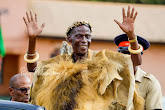The facilitator at today’s plantation meeting had a field day reminding me that this week, one of Zambia’s biggest and spectacular traditional ceremonies in Zambia, will be taking place in the Eastern part of the country. From Friday 23rd to Sunday, 25th February 2023, Chipata will be buzzing with a lot of activities for this year’s edition of the Ncwala.
As fate may have it, I stumbled open a treasure trove of the Ngoni (Isinguni) history that puts a spotlight on the background and happenings of Ncwala. This blogger did justice - I think - and I will just add a few of somethings here and there.
Ncwala is also called the 'First Fruits Harvest’ ceremony and has its roots in South Africa.
However, Ncwala didn’t start with Shaka Zulu as it is commonly
claimed though it could be true that the Ngoni broke away from the Nguni
speaking people of South Africa. The ceremony dates back way back, even before
the birth of the Zulu acclaimed leader. Even the Ngonis inspirational
figurehead, Zwangendaba was born when the ceremony was already a birthed
entity. With it, Zwangendaba left his tribal St Lucia Bay area to embark of a
dramatic and monumental journey that spanned more than three decades and
covered an astonishing 5000 plus kilometers.
He crossed the Zambezi River in 1835, 7 years after the death of
Shaka Zulu in 1828. When Zwangendaba died in 1845 and got buried in Nakpnde,
his kingdom disintegrated, forming many sister kingdoms around Central Africa.
The faction led by his eldest son, Nthutho or simply Mphezeni
settled in Chipata, East of Zambia. It's this same group that would take a lead
and indeed act as a poster group in treasuring the ceremony. From the first
Mphezeni the ceremony was celebrated. But in the evenings of his life, a new
adversary of the Ngonis that was looming nearby would put a crushing end to a
centuries’ old tradition.
Note that the name ‘Mpezeni’ doesn’t mean anything in Isinguni.
The actual name is ‘Mphezeni’ and in its full its Inkosi Yamakhosi Mphezeni
KaZwangendaba. Mphezeni is gotten from the word ‘Ukupheza.
The British had been told by their intelligence that Mphezeni's
land was rich in minerals. Thus, they set to colonize the area. But it was not
easy. Nsingu, Mphezeni's eldest son and crown Prince realized that the whites
were taking over his father's land clandestinely. He would not allow it, even
if it meant fighting with his life.
In 1897 he led his regiment and attacked the British station in
the Luangeni area. The British sent in reinforcements from neighboring Fort
Manning. The Ngonis revolt was halted. Nsingu was captured and executed after
being tried in a kangaroo court. But this was not enough, the British also
confiscated 12000 cattle from the Ngonis, burn their villages and fields. The
last nail on the coffin was banning the holding of the Ncwala describing it as
being 'war like'.
Mphezeni's grandson, Chiloah Jere took over after his grandfather
death in 1900. But the royal pilgrimage was never held during his reign. It was
under his son's reign, Pontino Jele that the Incwala was resurrected in 1980.
Since the time it was revamped, King Mphezeni moves from his Ekuphendukeni
Palace at Feni to Lawini at Mtengeluni every year in February.
The King is initially secluded where he goes through a cultural
rebirth. At Lawini, the King acquires new power from Nkulukulu to govern the
people. Traditionally, he is supposed to go into seclusion and fasting for at
least 3 days. When he comes out, the people come to worship their Ngwenyama for
he has survived meeting with Nkulunkulu.
Legend says some Kings were struck dead during the seclusion
period. During the last day of the event at the Mtengeluni arena, a black bull
is speared, and King Mphezeni is given its blood which he drinks.
The Black Bull serves two purposes:
1. Affirming to the King that his Impis (soldiers) were ready for
battle. In those days they killed it with bare hands, no rope no nothing only
the spear!!! Blackness represents completeness. White colour is not revered. It
has to be a black bull without spot.
2. The death of the bull spiritually represents the death of the
past, starting afresh in new, after the King has returned alive from seclusion
(where He receives a message from Nkulukulu). The bull’s blood is drunk as a
sign of brevity and recharging the spirit.
The ceremony in original Nguni custom is supposed to be held in
December, the last full moon to be exact. When the King consumes
ukhamba/igobongo that is concocted with iNcwala/uSelwa for 7 days before the
full moon.
If there’s any place you should be this weekend, is in
Chipata. Goodspeed, comrade!



No comments:
Post a Comment